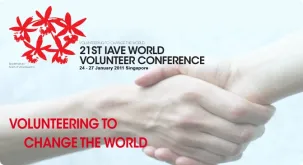In conjunction with the tenth anniversary of the International Year of Volunteers, the 21st IAVE World Volunteer Conference, 'Volunteering to Change the World', is taking place in Singapore this week. "IAVE provides all of us with an opportunity to bring major players in the field of volunteerism together, to discuss global trends and pave the way for a strengthened global volunteerism agenda," said UNV Executive Coordinator Flavia Pansieri in her conference speech of 23 January 2011.
In conjunction with the tenth anniversary of the International Year of Volunteers (IYV+10), the 21st IAVE World Volunteer Conference is taking place in Singapore this week. The International Association for Volunteer Effort (IAVE) provides all of us with an opportunity to bring major players in the field of volunteerism together, to discuss global trends and pave the way for a strengthened global volunteerism agenda, said UNV Executive Coordinator Flavia Pansieri in her conference speech of 23 January 2011.
With the theme Volunteering to Change the World, the conference aims to highlight the positive impact of volunteering on communities, and it provides an opportunity for non-profit leaders and decision makers to come together and explore how volunteerism can help create multiplier effects within communities and play a critical role in a sustainable future.
The International Year of Volunteers was celebrated ten years ago with a focus on volunteer recognition, facilitation, networking and promotion. Ms. Pansieri pointed out that this is still necessary today in order to enhance and strengthen networking opportunities among voluntary organizations, institutions and the volunteers themselves with a view to promoting greater citizen participation and involvement on a voluntary basis through an ever growing World Volunteer Coalition.
Through this conference, it is hoped that volunteer capital is truly recognized by governments, by businesses and by the not-for-profit sector itself for what it has to offer as an equal partner in building communities in a sustainable manner.
This year should offer an opportunity to go beyond still widespread perceptions of voluntary action as being supportive in the context of the provision of social services alone. Volunteering builds social capital and promotes social cohesion. In order to make a convincing case for volunteering and for increased institutional support to it, it is essential to be able to articulate impact, value added and also economic contributions of volunteering to society, Ms. Pansieri remarked.
The greatest case for volunteering comes from the impact of volunteering on individuals, the local community, the collectivity at large, so essential for successful societies, yet also so difficult to measure, she added. More work is needed to document these impacts. All of us here know, from research as well as from practical experience that voluntary engagement represents a net value added to society.
At the individual level, volunteering promotes social inclusion, increases the individual sense of self-worth and self-actualization, and contributes to skills development towards employment. At the community level, volunteering promotes social cohesion and enhances access to services, she continued.
Ms. Pansieri explained that UNV is currently working on the preparation of a global State of the Worlds Volunteerism Report (SWVR) to document, on the basis of solid academic research complemented by volunteer field experiences, the essential contributions of volunteering to society.
Ms. Pansieri went on to highlight the intrinsic empowerment value of volunteerism. She pointed out that being a volunteer entails a relation of reciprocity, where one benefits from ones voluntary activity, as much as this activity benefits its intended beneficiaries.
Anyone should be able to volunteer, and conditions need to be provided for this to happen. We see this daily in the programmes in which UN Volunteers are engaged. How often have I met men and women coming from the most difficult and constrained backgrounds, in Cambodia and Colombia, in Burkina Faso or Honduras, and in many other contexts, start as recipients of project support and gradually become themselves actors in their communities and role models for their peers, she remarked. The fact this phenomenon is geographically so widespread is proof that volunteering is a universal value. By nurturing it and promoting it, great progress can be made.
This Conference can be the voice, a strong confident voice, to tell governments: the Millennium Development Goals (MDGs) are too important, too necessary for the around 2 billion people living on less than $2/day, with poor or no access to services and opportunities. The MDGs are first and foremost a state and institutional responsibility, no doubt. But more, much more can be achieved, if we work together, if we unleash the power of people acting voluntarily to make a difference in the world we live in, she concluded. Lets not miss out on this opportunity. We, the volunteers, can be the change.

